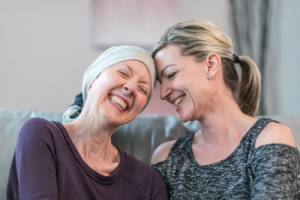
Offering words of encouragement and empathic conversation are crucial parts of cancer support.
Striking up a conversation with a family member with cancer can sometimes be awkward and leave you feeling unsure of what to say. Should you bring up their diagnosis right away, or avoid the C word altogether? Is it ok to try and make the person laugh? What should I do if they start crying? Conversations become loaded with unspoken emotions, and finding the right words to offer cancer support is not easy.
You’re not alone in this endeavor. Many families facing cancer wrestle with the challenge of communicating effectively in the midst of the uncertainty and fear. Here are some ideas to bear in mind to better navigate these difficult conversations:
- Take care of yourself: Supporting someone with cancer can be emotionally taxing. Don’t forget to prioritize your own well-being and seek support when you need it. By taking proper care of yourself, you’re going to be better able to support the person you love over time.
- Listen: Sometimes, the most reassuring thing you can do is to lend an empathetic ear. Let them share their fears, frustrations, and hopes without judgment or interruption.
- Respect their boundaries: Each individual’s journey with cancer is different. Respect their wishes regarding privacy and disclosure, and let them guide the conversation.
- Be sincere. Avoid clichés and platitudes that may feel empty. Instead, speak from the heart and offer sincere words of encouragement and support.
- Offer useful help: Take initiative in offering specific ways you can help, whether it is running errands, preparing meals, or providing transportation to appointments. These small acts of kindness can make a big difference in their everyday life.
In addition to these tips, it is vital to remember that every individual’s knowledge about cancer is different, and what works for one person might not necessarily work for another. Empathy and flexibility are key when navigating these sensitive conversations.
Finally, don’t underestimate the power of simply being there for the person you love. Your presence and support, even if you are not sure what to say, can provide immense comfort during this challenging time. So, take a deep breath, show up, and don’t forget that your love and support mean even more than you might realize.
Reach out to Responsive Home Care for help, too. Our caregivers are trained and experienced in supporting individuals with cancer and the families who love them with a variety of services, including:
- Light housekeeping, laundry, and linen changes
- Respectful assistance with personal care and hygiene, preserving dignity and independence
- Running errands, including food shopping and picking up prescriptions
- Friendly companionship to brighten each day
- Planning and preparing healthy meals, taking into consideration difficulty with appetite or any other challenging symptoms
- And much more
Serving Fort Lauderdale, Plantation, Lighthouse Point, as well as the nearby areas, we are just a phone call away at 954- 486-6440.












